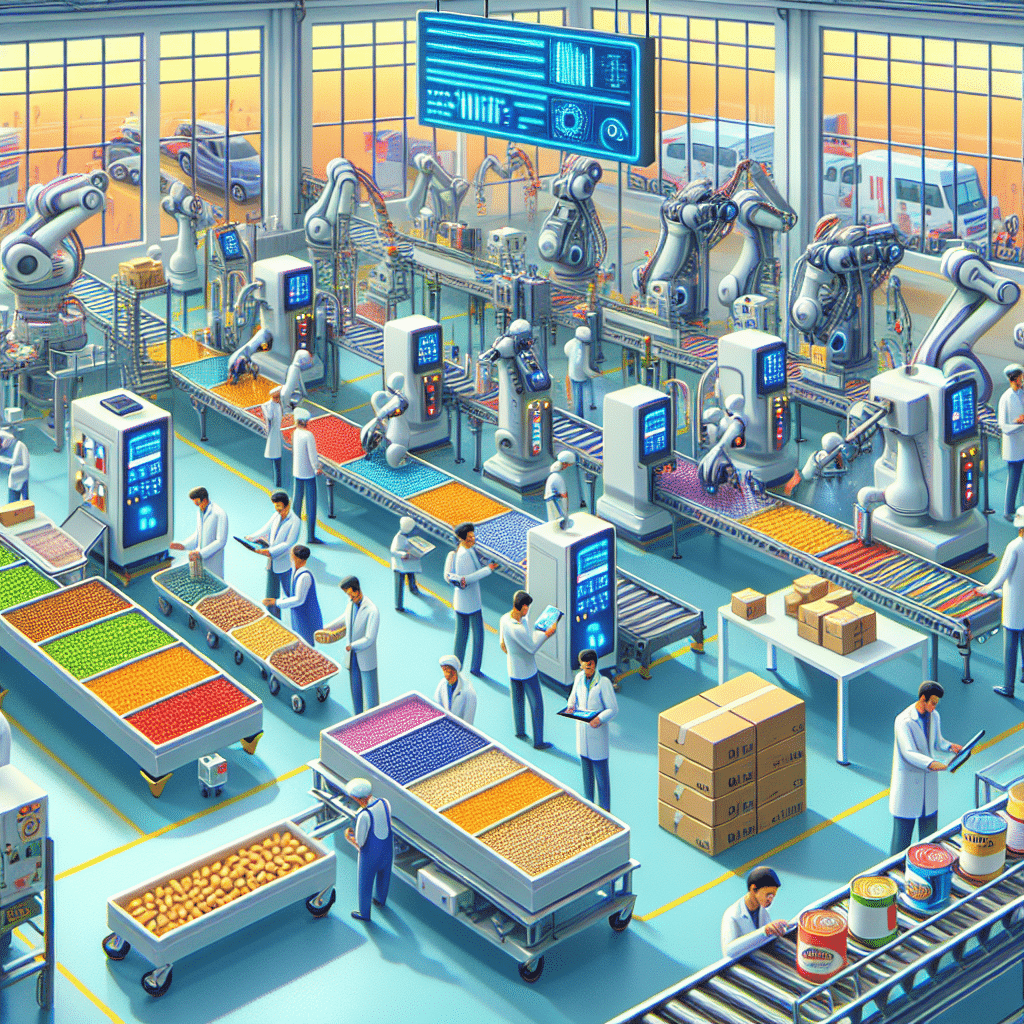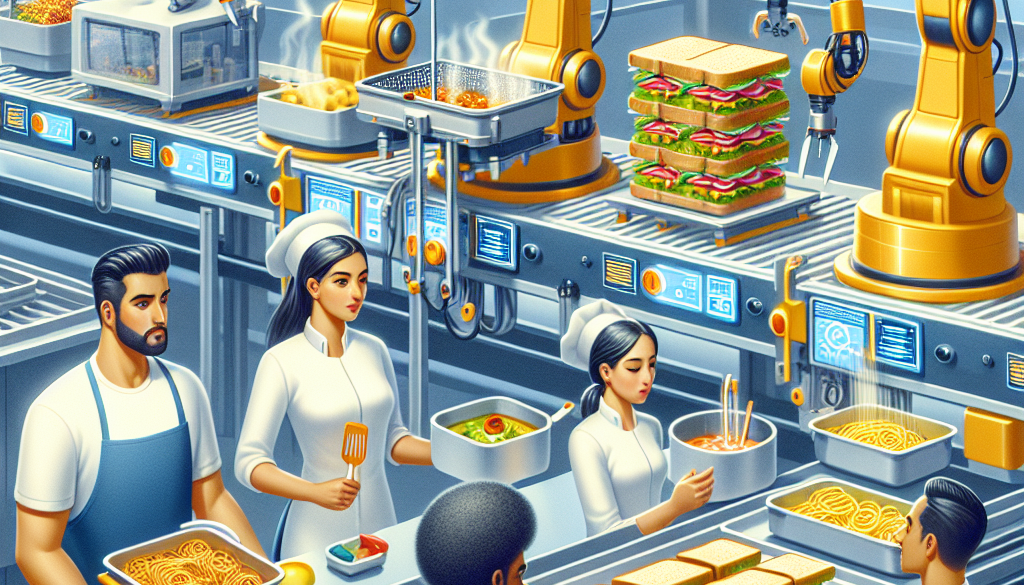The food industry was transforming and focused on automation.
-
Table of Contents
- Automation Revolution in the Food Industry: A Deep Dive
- The Rise of Automation in Food Production
- Efficiency and Cost Reduction
- Enhancing Food Safety and Traceability
- Challenges and Considerations
- Future Trends and Innovations
- Conclusion: Embracing the Automation Era
- ETprotein: Your Partner in Quality Protein Products
Automation Revolution in the Food Industry: A Deep Dive

The food industry has always been a cornerstone of human civilization, providing sustenance and pleasure to billions. However, in recent years, this age-old industry has been undergoing a significant transformation, with automation at the forefront of this change. The integration of advanced technologies is reshaping how food is produced, processed, and distributed, leading to increased efficiency, safety, and sustainability. In this article, we will explore the various facets of automation in the food industry and how it is revolutionizing the way we think about food production and consumption.
The Rise of Automation in Food Production
Automation in food production is not a new concept, but its adoption has accelerated in recent years. The use of robotics, artificial intelligence (AI), and machine learning has enabled food producers to automate complex tasks that were once labor-intensive. This shift is driven by several factors, including labor shortages, the demand for higher production volumes, and the need for precision and consistency in food quality.
- Robotic systems are now capable of planting, harvesting, and packaging produce with minimal human intervention.
- AI-powered quality control systems can detect imperfections in food products faster and more accurately than human workers.
- Automated vertical farms are becoming more prevalent, using space more efficiently and reducing the need for pesticides and herbicides.
Efficiency and Cost Reduction
One of the primary benefits of automation in the food industry is the significant increase in efficiency and the reduction of production costs. Automated systems can operate around the clock without the need for breaks, leading to higher output rates. Moreover, they can perform tasks with precision, reducing waste and improving yield.
- Statistics show that automation can increase production speeds by up to 15%, depending on the application.
- Automated machinery requires less manual labor, which can lead to cost savings in wages and reduce the impact of labor shortages.
- Energy-efficient automated systems can also lower utility costs and contribute to a smaller carbon footprint.
Enhancing Food Safety and Traceability
Food safety is a paramount concern in the industry, and automation plays a crucial role in ensuring that food products are free from contamination. Automated systems can help maintain clean and controlled environments, reducing the risk of foodborne illnesses.
- Robots equipped with UV-C light can sanitize equipment and surfaces without the use of chemicals.
- Automated tracking systems provide detailed traceability, allowing for quick responses to potential contamination issues.
- AI algorithms can predict potential outbreaks of foodborne illnesses by analyzing data from various sources.
Challenges and Considerations
Despite the many advantages, the transition to automation in the food industry is not without its challenges. The initial investment in automated technology can be substantial, and there is a need for skilled personnel to manage and maintain these systems. Additionally, there are concerns about the impact on employment, as automation could potentially displace workers.
- Companies must weigh the long-term benefits against the upfront costs of automation technology.
- Training programs are essential to equip the workforce with the skills needed to operate and maintain automated systems.
- There is a growing emphasis on creating new job roles that complement automated processes rather than replace human workers.
Future Trends and Innovations
The future of automation in the food industry is bright, with ongoing research and development paving the way for new innovations. Advancements in robotics, AI, and the Internet of Things (IoT) are expected to further enhance the capabilities of automated systems.
- Smart sensors and IoT devices will enable real-time monitoring and optimization of food production processes.
- AI-driven personalization will allow for customized food products tailored to individual dietary needs and preferences.
- Robotics will continue to evolve, with more dexterous and sensitive machines capable of handling delicate food items.
Conclusion: Embracing the Automation Era
The transformation of the food industry through automation is an ongoing process that holds great promise for the future. By embracing these technological advancements, food producers can achieve higher efficiency, improved safety, and greater sustainability. While challenges remain, the potential benefits of automation make it an essential component of the modern food industry. As we continue to innovate and adapt, the way we produce and consume food will undoubtedly evolve, leading to a smarter, safer, and more efficient food system for all.
ETprotein: Your Partner in Quality Protein Products
In line with the advancements in the food industry, ETprotein company stands out as a provider of high-quality protein products that cater to the evolving needs of consumers. Their range of organic bulk vegan proteins and L-(+)-Ergothioneine (EGT) products are perfect for businesses looking to incorporate nutritious and sustainable ingredients into their offerings.
- ETprotein’s products are non-GMO, allergen-free, and feature a neutral taste, making them versatile for various applications.
- Their commitment to purity and quality ensures that you receive the best ingredients for your food and beverage products.
- With a focus on customer satisfaction, ETprotein offers tailor-made solutions to meet the specific needs of your business.
Whether you are in the nutraceutical, pharmaceutical, or food and beverage industry, ETprotein can provide the protein solutions you need to stay ahead in the automated future of food production. Contact them today to learn more about their products and how they can support your business.
About ETprotein:
ETprotein, a reputable protein and L-(+)-Ergothioneine (EGT) Chinese factory manufacturer and supplier, is renowned for producing, stocking, exporting, and delivering the highest quality organic bulk vegan proteins and L-(+)-Ergothioneine. They include Organic rice protein, clear rice protein, pea protein, clear pea protein, watermelon seed protein, pumpkin seed protein, sunflower seed protein, mung bean protein, peanut protein, and L-(+)-Ergothioneine EGT Pharmaceutical grade, L-(+)-Ergothioneine EGT food grade, L-(+)-Ergothioneine EGT cosmetic grade, L-(+)-Ergothioneine EGT reference grade and L-(+)-Ergothioneine EGT standard. Their offerings, characterized by a neutral taste, non-GMO, allergen-free attributes, with L-(+)-Ergothioneine purity over 98%, 99%, cater to a diverse range of industries. They serve nutraceutical, pharmaceutical, cosmeceutical, veterinary, as well as food and beverage finished product distributors, traders, and manufacturers across Europe, USA, Canada, Australia, Thailand, Japan, Korea, Brazil, and Chile, among others.
ETprotein specialization includes exporting and delivering tailor-made protein powder and finished nutritional supplements. Their extensive product range covers sectors like Food and Beverage, Sports Nutrition, Weight Management, Dietary Supplements, Health and Wellness Products, and Infant Formula, ensuring comprehensive solutions to meet all your protein needs.
As a trusted company by leading global food and beverage brands and Fortune 500 companies, ETprotein reinforces China’s reputation in the global arena. For more information or to sample their products, please contact them and email sales(at)ETprotein.com today.












